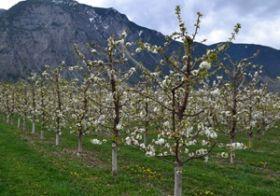
The Canadian minister for agriculture, Gerry Ritz, has announced that cherries from British Columbia, Canada’s westernmost province, have gained access to China, according to a report by the Fresh Fruit Portal.
British Columbian blueberries have also secured greater access, with an agreement for exports in 2014 currently being negotiated.
Ritz’s announcement follows a week-long trade mission in Beijing and Hong Kong which aimed to double bilateral trade between China and Canada by 2015.
The Canadian Ministry of Agriculture posits that their sales of agriculture products to China generated C$5bn (US$4.9bn) in 2012.
The British Columbian Cherry Association estimates that cherry sales to China will generate C$10m (US$9.8m) by 2014 and C$20m (US$19.7m) over the next five years, the Fresh Fruit Portal reports.
Canadian cherries have a particular appeal to Chinese consumers given their seasonal availability after the peak arrivals from the Pacific Northwest, which affords them a later window of market opportunity.
This is particularly pronounced given the Canadian cherry season’s concurrence with China’s National Day celebrated annually on 1 October and the Mid-Autumn Festival, celebrated in September or early October.
Alongside their ideal timing, the fruit’s high quality has ensured rapid expansion of exports in recent years and should prove appealing to Chinese consumers whose increasing disposable income means they can afford to pay for quality.
“With their high brix levels and their timing just after the US cherries, we see a lot of potential for growth of Canadian cherries,” said Owen Ou of Dalian Yidu Group, who is based at the group’s Guangzhou office at Jiangnan wholesale market.
Dalian Yidu has been working with Canadian suppliers for several years, and Mr Ou said that import volumes are increasing annually as Chinese consumers become more affluent and concerned with product quality and health.
“Nowadays, the consumer is more aware about fruit quality and health benefits. Demand for top-quality fruit is growing, which means that Canadian cherries have a lot of future potential in China.”



